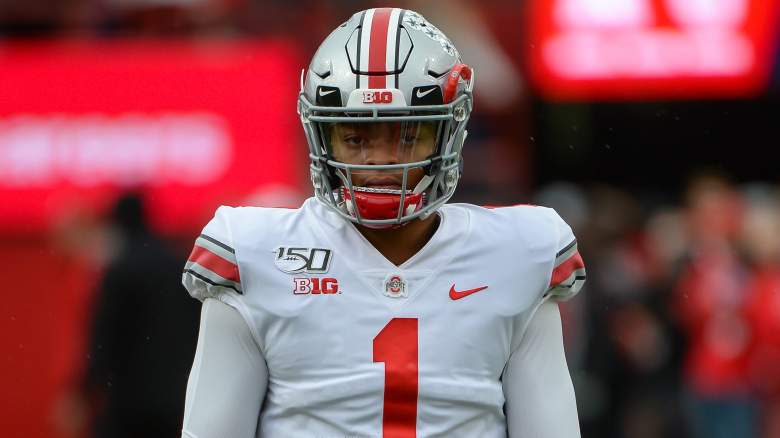
Getty Bears QB Justin Fields
Justin Fields has yet to take an NFL snap, but he’s giving fans of the Chicago Bears myriad reasons to have hope for the future.
Fields recently spent time this summer working out with other clients of his agent, David Mulugheta, which included Green Bay Packers quarterback Jordan Love and Houston Texans QB Deshaun Watson. The workout was led by quarterbacks coach Quincy Avery, who has also worked with Watson, Fields and many others privately for years.
In a July 16 feature for USA TODAY Sports, Jori Epstein profiled Fields, and interviewed a few people close to the rookie QB — along with Super Bowl winning MVP Patrick Mahomes — in order to better examine the ways uniquely gifted quarterbacks process information. Spoiler alert: Fields and Mahomes have a similar way of processing information.
The latest Bears news straight to your inbox! Subscribe to the Heavy on Bears newsletter here!
Fields Has ‘Off the Charts’ Football IQ
In his article, Epstein discusses Fields’ performance on the Athletic Intelligence Quotient (AIQ) test, which has been taken by many of the top QBs past and present — and apparently, it doesn’t get much better than the 22-year-old Bears signal-caller:
“The test’s aim,” Epstein wrote, is to “capture a player’s intellectual capacity in areas including learning efficiency, visual-spatial processing, decision-making and reaction time. In the 16-question learning efficiency section—think: 16 paired concepts that athletes needed to absorb and then reiterate—Fields identified all 16 responses correctly. … Of 125 professional quarterbacks who have tested (not all are currently on active rosters) in the last decade, only four other quarterbacks hit all 16.”
The AIQ test, which was co-created by sports psychologist Scott Goldman, doesn’t predict performance, but, rather, comments on how well and efficiently quarterbacks process information mentally. Apparently, Fields’ test scores are extremely rare.
“It happens less than 1% of the time. It’s super rare,” Goldman told USA TODAY Sports. “What it means is we actually didn’t capture his ceiling. We don’t know, (given) he got 16 out of 16 right, is it possible he could have gotten 20 out of 20? 25? 30?”
“His ability to transpose things and flip them in his mind, like the mental rotation? Not a lot of people have that,” Avery told Epstein in reference to Fields. “That’s going to give his coaches a distinct advantage as they want to expand the playbook… His memory, and it’s not just me saying that: We’ve tested those things and Justin’s memory is off the charts.”
If his football intelligence translates to production and wins on the field, the Bears will finally have their quarterback of the future.
Follow the Heavy on Bears Facebook page, where you can weigh in on all the latest Bears-related breaking news, rumors, content and more!
Mahomes on Mental Recall: ‘It’s Kind of Like a Machine’
Epstein also interviewed Mahomes for the article, and as it happens, the Chiefs quarterback and the Bears rookie seem to have similar mental processes when it comes to information intake and play memorization.
“I remember saying the plays into a little voice recording and then playing it back to myself,” Mahomes told USA TODAY Sports about how he learned the Chiefs playbook. “I remember me and my girlfriend at the time – now my fiancée – I’d get her to look at the plays, and I’d read them out like I was talking in the huddle. There’s all different techniques. I’d write ’em down a million times until I was finally comfortable to say them on Sundays.”
“Once you’re comfortable enough to say it, it’s kind of like a machine to get it out,” Mahomes added. “Guys know where to go. You can get out there and play fast when you’re on the field.”
For his part, Fields revealed a similar logic to the way he has been learning new plays. “Shifts, formations, protections,” Fields told Epstein, “You’ve kind of just got to break that play down, picture it out and picture the play before you say it. Now since I know it, I actually can see the play before I call it, and it’s easier.”
“Right now, I have a base idea of what plays we have, so just diving into that more just focusing on the small details. When you have a big base you can really start detailing each and every specific thing on a play and really get to know a play like the back of your hand,” Fields said last month.
“I would say that’s the biggest change for me. It’s not even the play call. It’s not the reads, none of that stuff, but it’s going to be saying the play in the huddle. Some of our play calls are really long. That’s what I do. I get the script the night before and I just go through them and read them. Once I go through it a few times, boom I have it down like that [snaps fingers].”
To be clear: No one is comparing Fields’ game to that of Mahomes — that would be ludicrous. But in terms of how the two young quarterbacks compartmentalize, process plays, and ingest new information — they both seem to be incredibly similar.
What happens on the field is another story, of course, but the mental game is a huge part of football, as players like Mahomes, Peyton Manning and Aaron Rodgers have proven. After four years of Mitchell Trubisky getting easily confused by defenses on a weekly basis, it would be a refreshing change of pace to see a signal-caller who understands what he’s calling and why. We’ll know soon enough if Fields is that guy.
READ NEXT: Bears QB Justin Fields Goes Viral for Uniform Modification: [LOOK]
Comments
Key Justin Fields-Patrick Mahomes Similarity Revealed By Analyst